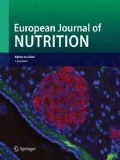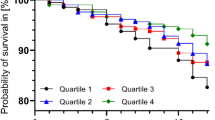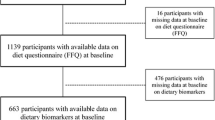Summary.
Background: Although an important secondary prevention trial reported an impressive protection by a Mediterranean dietary pattern on reinfarction and cardiovascular death, scarce direct epidemiologic evidence is currently available regarding the role of the Mediterranean diet in the aetiology of coronary heart disease. Aims: The aim of the study was to quantify the risk reduction of incident myocardial infarction provided by a Mediterranean dietary pattern. Methods: We included 342 subjects (171 patients who suffered their first acute myocardial infarction and 171 matched controls) in a case-control study. A validated semi-quantitative food frequency questionnaire (136 items) was used. We defined an a priori Mediterranean dietary pattern. We assessed six food items that we considered protective: 1) olive oil, 2) fiber, 3) fruits, 4)vegetables, 5) fish and 6) alcohol. For each of these six dietary factors, we calculated the distribution according to quintiles within the study and assigned each participant a score of 1 to 5 corresponding to the quintile of intake, with 1 representing the lowest and 5 representing the highest quintile. We also estimated the quintiles of two other elements assumed to be associated with a higher risk: 7) meat/meat products and 8) some items with high glycaemic load (white bread, pasta and rice). For these two elements we inversely ranked the score, with 1 representing the highest and 5 representing the lowest quintile. Finally, we summed up the eight quintile values for each participant.
A second score (post hoc pattern) was built using only a single cut-off point for these eight elements. The cut-off points for each element in this post hoc pattern were decided according to the dose-response relationships between the consumption of each food item and the risk of myocardial infarction observed in the analyses that used quintiles of each food item. Results: For both patterns, we found that the higher the score, the lower the odds ratio of myocardial infarction. A significant linear trend was apparent after adjustment for the main cardiovascular risk factors. For each additional point in the a priori Mediterranean pattern (observed range: 9–38) the odds ratio (95 % confidence intervals) was 0.92 (0.86–0.98). This estimate was 0.55 (0.42–0.73) when we used the post hoc pattern (range: 0–8). Conclusions: Our data support the hypothesis that a Mediterranean diet (that emphasizes olive oil, fiber, fruits, vegetables, fish and alcohol and reduces meat/meat products) can be an effective measure for reducing the risk of myocardial infarction. However, our results support the exclusion of refined cereals with a high glycaemic load as healthy elements of this pattern.
Similar content being viewed by others
Author information
Authors and Affiliations
Additional information
Received: 24 January 2002, Accepted: 13 May 2002
Rights and permissions
About this article
Cite this article
Martínez-González, M., Fernández-Jarne, E., Serrano-Martínez, M. et al. Mediterranean diet and reduction in the risk of a first acute myocardial infarction: an operational healthy dietary score. Eur J Nutr 41, 153–160 (2002). https://doi.org/10.1007/s00394-002-0370-6
Published:
Issue Date:
DOI: https://doi.org/10.1007/s00394-002-0370-6




